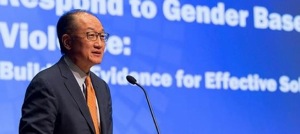World Bank President Jim Yong Kim. Photo: Facebook
[Commentary]
As the World Bank Group’s spring meetings get underway in Washington, DC, the Bank’s complicity in corporate grabbing of land and natural resources around the world has become more blatant than ever.
As large-scale land acquisitions increased by close to 20 percent over the past year, a growing number of land defenders and indigenous leaders faced intimidation, arrests and even death. Environmental devastation is spreading across the developing world, involving the destruction of forests—a major cause of climate change—the transformation of rural landscapes into large monocropping plantations, the loss of biodiversity, the pollution of water, and the destruction of livelihoods and natural environments for millions of people.
The World Bank, which was established to fight poverty, could work to defend vulnerable communities against evictions, dispossession, and the destruction of their livelihoods, and prevent further ecological stress from intensive agriculture. Yet it does just the opposite.
The World Bank finances agribusinesses that violate land rights, such as the palm oil company Dinant in Honduras, accused of using intimidation and deadly violence against residents contesting acquisition of communal lands. In countries such as Uganda, Cambodia, or Kenya, the Bank’s funding has resulted in forced evictions of local communities.
When its funding does not back brutal corporate takeover of land, the World Bank still fuels land concentration, natural resources depletion, and environmental pollution through growing financing of resource-intensive agribusinesses. Over the past decades, the Bank’s private sector arm, the International Finance Corporation (IFC), massively scaled up its agribusiness investments. From less than $500 million per year in the early 2000s, the IFC’s agribusiness portfolio reached $5.6 billion in 2016.
Through the creation of agriculture policy indexes, the World Bank spearheads a campaign for an industry-driven agricultural transformation in developing countries, conditioned to ensure smallholders’ exit from farming. The Bank’s Enabling the Business of Agriculture (EBA) index pushes governments to facilitate the import of chemical fertilizers; the production and marketing of industrial seeds; and to facilitate “efficiency enhancing” land transfers—i.e. farmland sales or leases to agribusinesses.
Promoting a so-called “commercially-oriented” agricultural transformation, the Bank portrays farmers’ forced out of agriculture through land transfers as an “opportunity” to take up non-agricultural employment and obtain better livelihoods.
In reality, giving up land and small-scale agriculture hardly reduces poverty. Wealth redistribution from agricultural investments is seldom equitable; job creation and labor conditions on large farm holdings mostly fail to match the revenue, quality of life, and employment levels generated by small farms; and rural migration towards over-populated, unemployment-stricken cities does not improve livelihoods. The Dinant case is illustrative of this – on top of being involved in land disputes that has led to the death of over 100 farmers since 2009, the company imposes extremely difficult work conditions, high palm harvesting quotas, and unprotected use of chemicals to low-paid farm workers.
In the early months of 2017, a law suit was brought against the IFC for its financing of Dinant. Over 150 civil society organizations and 5,500 people wrote to the World Bank demanding the end of the Enabling the Business of Agriculture project.
This should be a wake up call for the Bank’s directors who must urgently put an end to outrageous complicity in agribusiness expansion and abuses around the world, this spring meeting The Bank violates its own mandate and leads a fight against the poor. This has to stop now.
Anuradha Mittal, Executive Director
The Oakland Institute
www.oaklandinstitute.org






